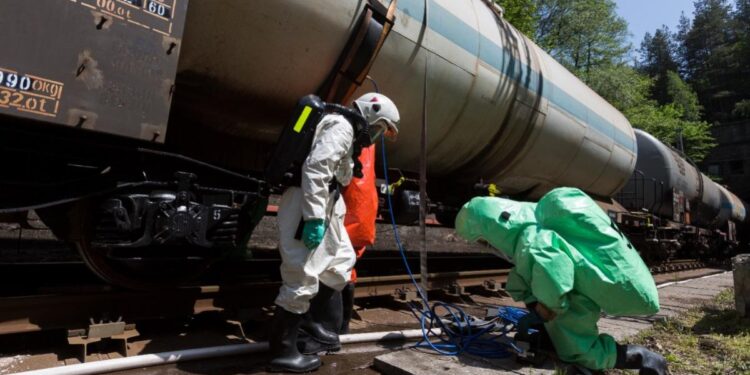On February 3, 2023, on Norfolk Southern Railway’s general merchandise freight train 32N, a suspect bearing on the twenty-third car measured at 38°F above ambient, then 103°F above ambient, then 253°F above ambient. In East Palestine, Ohio, eleven tank cars derailed and hazardous materials ignited.
First responders mitigated the fire, but afterward the temperature was still rising in one tank car that carried vinyl chloride liquid. Responders expanded the evacuation zone, dug ditches, released the vinyl chloride into the ditches, and burned it.
There’s a better way.
Vinyl chloride presents a complex real-world challenge. It’s efficiently produced using competitively priced feedstocks and energy. Its product, PVC, is safe in use, cost-effective, and valuable in important applications. But producers of vinyl chloride and PVC, like many commodity-chemical industry producers, have had to contend with overbuilding that left them with overcapacity. They had to retrofit processes after vinyl chloride’s carcinogenicity was discovered. Now they have chronically lower research funding.
To limit hazardous transport, vinyl chloride or PVC producers could relocate plants or build new plants to further colocate vinyl chloride production and PVC production. To keep pricing favorable, colocated producers could merge. But in an industry that has massive existing capital investment, such big moves would be costly, slow, and risky.
It appears much more practical to simply better maintain railways and rolling stock and mitigate any remaining accidents by developing better emergency processes, equipment, and operations. But even getting such limited tasks engineered and executed well would require there to be a suitable incentive structure.
Incentives Done Poorly versus Done Well
Government actors don’t lose when they fail; they gain by presenting themselves and more funding as the solutions. They wouldn’t benefit from developing expertise in engineering; they really only benefit from developing expertise in political maneuvering.
The way to prevent losses is to make tort lawsuits great—like in the 1820s, and better. Economist Walter Block provides background:
Up to the 1820s and 1830s, the legal jurisprudence in . . . the U.S. was more or less predicated upon the libertarian vision of non invasiveness. Typically, a farmer would complain that a railroad engine had emitted sparks which set ablaze his haystacks or other crops. . . . Almost invariably, the courts would take cognizance of this violation of plaintiff’s rights. The usual result during this epoch was injunctive relief, plus an award of damages.
But then in the 1840s and 1850s a new legal philosophy took hold. No longer were private property rights upheld. Now, there was an even more important consideration: the public good. And of what did the public good consist in this new dispensation? The growth and progress of the U.S. economy.
From roughly 1850 to 1970, firms were able to pollute without penalty. This . . . was a failure of the government to uphold free enterprise with a legal system protective of private property rights.
In the 1970s a “discovery” was made: the air quality was dangerous to human beings and other living creatures. Having caused the problem itself, the government now set out to cure it, with a whole host of regulations which only made things worse. . . . “Rent seeking” played a role in the scramble, as eastern (dirty burning sulfur) coal interests prevailed over their western (clean burning anthracite) counterparts. The former wanted compulsory scrubbers, the latter wanted the mandated substitution of their own coal for that of their competitors.
Libertarian noninvasiveness is still used in places. Where it’s used, it works great.
When Hurricane Katrina devastated industry, for instance, the insurance company FM Global found that damages were only 12 percent as large for insured locations that had implemented its engineering recommendations.
FM Global’s engineering knowledge and research shows that most losses are preventable. CEO Shivan Subramaniam explained:
Our customers are the ones who don’t want to have a loss. So, the actual insurance thing is almost a second or third step in the process. The first step is, can you help me put in place procedures that prevent something from happening, and even if it does happen, can contain it.
Limiting Governments, Freeing People
Preventing deprivations of life, liberty, and property for all persons is an underappreciated challenge that requires both intellectual prowess and emotional intelligence. Deprivations of property can be addressed well by a functioning tort system.
Judges can protect sympathetic victims who are affected by products, but judges should equally protect all persons who invest in or produce products. The current bastardized tort system is a Progressive mechanism for grabbing rents and distributing these spoils to donor blocs and voting blocs.
What’s needed is to place the full costs, responsibility, and rewards in the hands of producers, aided by insurers. To do this, politicians and governments must be limited to only providing dispute resolution, and only for now while private adjudicators build more efficient, proactive services.
When we break each problem into its component parts and we each do only the parts that we can do well ourselves, our successes at together solving problems and adding value become breathtaking.
















